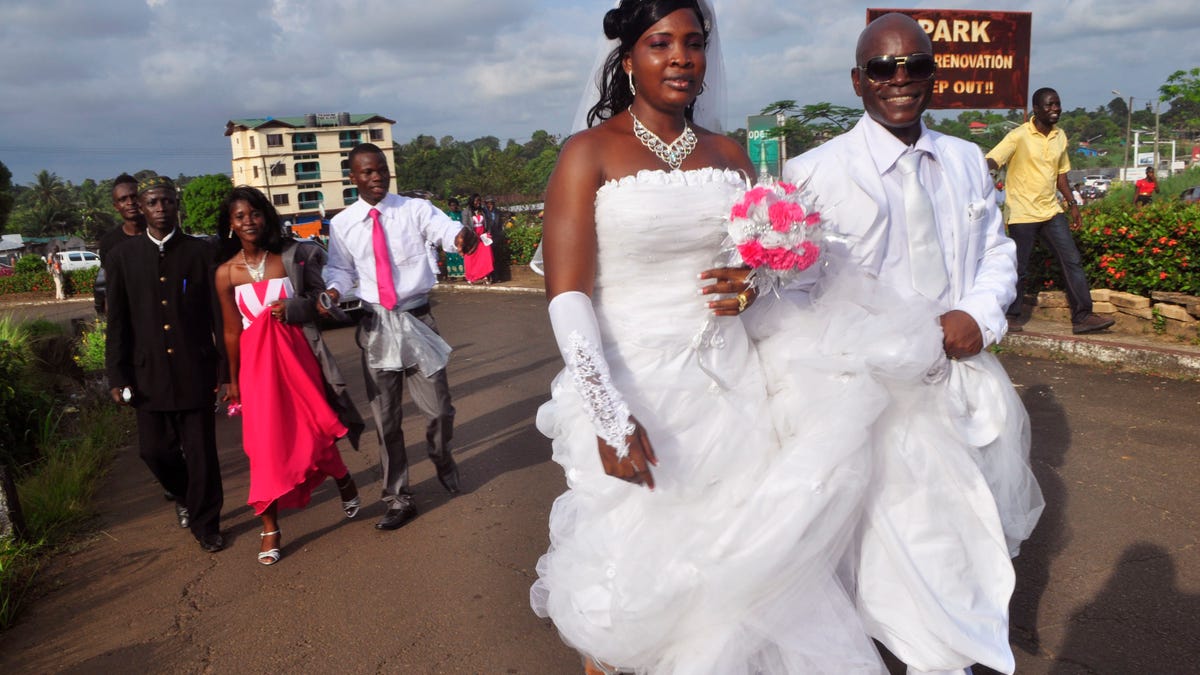
In this photo taken on Saturday, Nov. 15, 2014, an unidentified couple that just got married walk in a park used for wedding photography in the city of Monrovia, Liberia. (AP Photo/ Abbas Dulleh)
Robert Kollie and his fiancee postponed their October wedding as Ebola ravaged Liberia's capital. The government had warned people to avoid large gatherings. Weddings are full of kissing and hugging and just one unknowingly sick person could infect dozens.
A month later, even as Ebola continues to ravage parts of West Africa, the situation has improved in Monrovia and a scenic park in the eastern suburbs is once again busy on weekends with photographers shooting bridal parties. The Kollies were among them.
"When Ebola was spreading and at the same time my wedding was being prepared, I asked myself what will I tell God if I die in this crisis and don't get married?" Yongor Kollie, 31, told The Associated Press, flanked by her bridesmaids. "And so today, I am a happy woman."
Happy but still cautious.
"Even before coming here, we had to wash our hands," said the 33-year-old groom, referring to the ubiquitous plastic buckets with water and bleach that Liberians have come to accept as a daily part of life.
Liberia has been hardest hit of the West African countries battling Ebola outbreaks, with more than 2,800 people killed this year. But the number of new cases has dropped precipitously in Monrovia after months of public awareness campaigns emphasizing the need to isolate the sick and get tested as soon as symptoms emerge, according to the World Health Organization.
Other hotspots are popping up in areas of Liberia outside Monrovia as well as in neighboring countries. Sierra Leone is particularly hard-hit now, with dozens of new cases reported weekly in the capital, Freetown. Cases continue to emerge in Guinea, believed to be ground zero for this Ebola outbreak, the world's worst.
"It is absolutely premature to start being optimistic," Birte Hald of the International Federation of Red Cross and Red Crescent Societies said Monday in Brussels. She noted that the virus "is flaring up in new villages, in new locations."
In Monrovia, though, ordinary life is resuming and there are some signs of normalcy that were all but absent during the height of the crisis here. Washing hands before entering is no longer enforced in many shops. Radio stations are not playing anti-Ebola jingles as often as they did two months ago.
And on Sunday, a small park near the Ministry of Health was full of cameramen jostling for space to get the best shots of the newly wedded.
Jordan Jackson, 36, and his bride Jacquelyn, 33, were married on Sunday after more than a decade together. The couple already has three children - 10, 7 and 5 years old - who took part in the ceremony along with them.
"The feeling I am leaving this park with this afternoon is that Liberia is returning to normalcy and things are getting better," the groom said.
Jacquelyn, a hairdressing instructor, said she felt proud to tie the knot - though that can't relieve the pain of losing some of her friends to Ebola: "I just gave God the glory because I am alive."








































